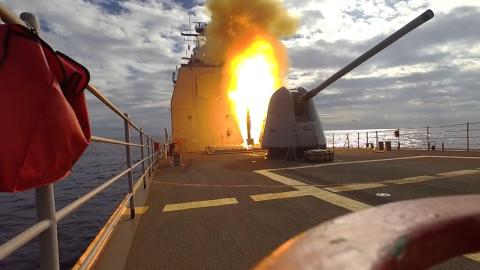“A great wall of steel, forged by the flesh and blood of over 1.4 billion Chinese people.” That is what Chinese leader Xi Jinping believes is backing the Chinese Communist Party as it seeks to expand its influence and erode America’s presence in Asia.
Whether we take Mr. Xi at his word and work to preserve American strength will define the next decade of U.S. national security.
As Adm. Phil Davidson, then head of U.S. Indo-Pacific Command, testified, Beijing wants to have the ability to invade Taiwan by 2027. Taking out U.S. assets in the region is an important part of the CCP’s war plans, and China’s People’s Liberation Army has invested heavily in modernizing and expanding its rocket forces.
The Department of Defense itself recognizes this growing challenge: Our combatant commanders have admitted that our military cannot match China’s theater-range missiles.
At Veterans on Duty, where I serve as chairman, we believe that these threats cannot go unaddressed. The United States is distracted, and the Pentagon is slow to change. America’s enemies are on the march. Our armed forces must be fully equipped to meet them.
Veterans in Congress especially understand this imperative. To this end, Sen. Joni Ernst of Iowa and Rep. Mike Gallagher of Wisconsin have introduced legislation to require the Pentagon to develop a strategy for offsetting China’s missile advantage in Asia.
With shorter-range capabilities unfunded and intermediate-range systems still under development, U.S. territories such as Guam, our naval forces, and Taiwan are vulnerable to devastating Chinese attacks.
These systems have the power to win — or lose — a potential conflict with China.
As Ms. Ernst and Mr. Gallagher propose, supporting a “rings of fire” approach to close the missile gap with Beijing and would “enhance deterrence and pose dangerous dilemmas” for Chinese military planners and could “shift the regional balance of power in our favor.”
It also calls on the Pentagon to work with allies and partners, such as Australia, to share this defense burden and field interoperable missile systems of their own. We fully support them in this critical legislative effort.
Why does the relative balance of missile systems thousands of miles away matter? It’s simple: Our American way of life depends on a free and open Indo-Pacific.
We cannot allow China to dominate the region, intimidate our allies, or forcibly retake Taiwan. A Chinese-dominated Asia would fundamentally change Americans’ everyday lives.
Veterans in Congress like Ms. Ernst and Mr. Gallagher are stepping up, not only to ensure our military is equipped to deter conflict, but also to fight and win one if necessary. It is far past time we get serious about preparing our military.
If the Pentagon and the Biden administration will not prioritize closing this glaring gap, then our veterans serving in the House and Senate will take the lead.
Americans deserve a military that is ready to defend U.S. interests. The rings-of-fire legislation aims to do just that.
Instead of playing politics and yielding to bureaucracy, they are leading with a bias for action. The stakes could not be higher.

















